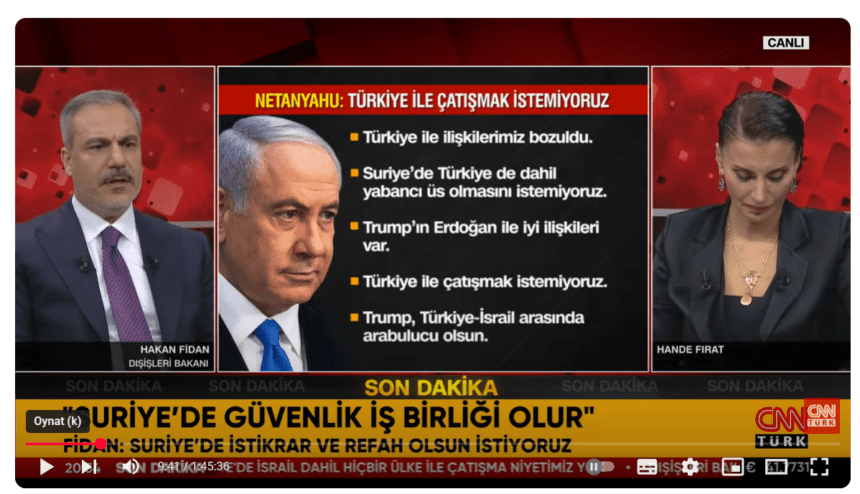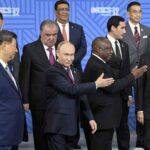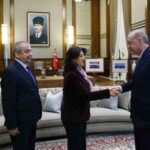Turkish Foreign Minister Hakan Fidan has confirmed that Turkey is engaging in technical-level talks with Israel aimed at avoiding military clashes in Syria—a significant move that subtly acknowledges Israel’s role as a legitimate actor in the war-torn country.
“Just as we have mechanisms with the Americans and the Russians, we need similar deconfliction arrangements with Israel, which also flies aircraft in Syrian airspace,” Fidan said during a televised interview on CNN Türk on March 9. “Of course, it is normal to have contacts at the technical level to establish this.”
Fidan was quick to clarify that the ongoing military coordination does not amount to a political normalization of relations, which remain deeply strained due to Israel’s ongoing war in Gaza. Turkey has reportedly “suspended” all trade with Israel and recalled its ambassador, with President Recep Tayyip Erdoğan accusing Israeli Prime Minister Benjamin Netanyahu of committing “state terror” and “genocide.”
Even so, Fidan’s remarks marked a shift in Ankara’s public rhetoric by placing Israel alongside other recognized international stakeholders in Syria—including the United States, Russia, Iran, Jordan, and Iraq—each with what he described as “their own security objectives.” This framing implies a functional acknowledgment of Israel’s operational presence in Syria.
“In Syria, as we conduct operations—whether by air or otherwise—we must establish a deconfliction mechanism with Israel, just as we did with the Americans and Russians,” Fidan explained. He noted that Turkey has long operated similar systems with Russia during its period of regional dominance, with the United States, and later with Iran.
He emphasized that Turkey does not seek confrontation with any state operating in Syria: “We have no intention of clashing with any country there—not just Israel.” Instead, he said, Ankara’s priority is to prevent destabilization that could spill into Turkish territory: “If instability emerges in a neighbouring country that affects us negatively, we cannot simply stand by.”
Fidan was also critical of Israel’s recent conduct in Syria, particularly since the departure of Syrian President Bashar al-Assad in December. He accused Israel of systematically destroying Syria’s military infrastructure in a bid to deprive the new government of key capabilities. “They’re striking everything a regular army would need—aircraft, helicopters, radar and defense systems—step by step,” he said. “It’s clear they want to leave the new administration without any military assets.”
Yet despite these criticisms, Fidan’s remarks reveal a highly complex geopolitical theater. “This is not a special arrangement for Israel,” he stressed. “We have to coordinate with all actors—whether it’s Israel, Russia, the U.S., or forces from Jordan and Iraq. This is a military necessity.”
Fidan also revealed that Turkey, Jordan, Iraq, Lebanon, and the new Syrian government have begun forming a regional platform focused on counterterrorism and border security. “This platform—especially in fighting ISIS—has proven very useful,” he said, describing it as Syria’s first serious effort in years to engage constructively with its neighbours.
While technical military coordination with Israel is being discussed, Fidan reiterated that political normalization remains off the table until there is a lasting ceasefire in Gaza and humanitarian aid is allowed to flow. “Defining Turkey-Israel normalization through Syria is misleading at this stage,” he noted. “Our President has made it clear—we have severed trade and recalled our ambassador.”



